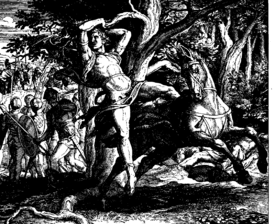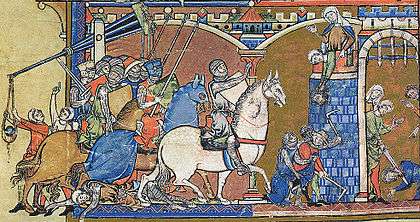Joab
Joab (Hebrew יוֹאָב Modern Yo'av Tiberian Yôʼāḇ) the son of Zeruiah, was the nephew of King David and the commander of his army, according to the Hebrew Bible.

Name
The name Joab is derived from Yahweh (יהוה), the name of the God of Israel, and the Hebrew word 'av' (אָב), meaning 'father'. It therefore means 'Yahweh [is] father'.
Biblical narrative
Joab was the son of Zeruiah, a sister of king David. David made him captain of his army (2 Samuel 8:16; 20:23; 1 Chronicles 11:6; 18:15; 27:34). Joab had two brothers, Abishai and Asahel. Asahel was killed by Abner in combat, for which Joab took revenge by murdering Abner against David's wishes and shortly after David and Abner had secured peace between the House of David and the House of Saul (2 Samuel 2:13-3:21; 3:27).
After leading the assault on the fortress of Mount Zion, Joab was promoted to the rank of General (1 Chronicles 11:4-6; 27:34). He led the army against Aram, Ammon, Moab and Edom. He also colluded with David in the death of Uriah (2 Samuel 11:14-25).

Joab played a pivotal role as the commander of David's forces during Absalom's rebellion. Absalom, one of David's sons, rallied much of Israel in rebellion against David, who was forced to flee with only his most trusted men. However, David could not bring himself to harm his son, and ordered that none of his men should kill Absalom during the ensuing battle. However, when a man reported that Absalom had been found alive and caught in a tree, Joab and his men killed him (2 Samuel 18:1-33).
Hearing of David's grief over the reported death of Absalom, Joab confronted and admonished David. The king followed Joab's advice to make a public appearance to encourage his troops (2 Samuel 19:1-8).
David later replaced him as commander of the army with David's nephew, Amasa (2 Samuel 19:13). Joab later killed Amasa (2 Samuel 20:8-13; 1 Kings 2:5).
Joab and other commanders began questioning David's judgment (2 Samuel 24:2-4). As David neared the end of his reign, Joab offered his allegiance to David's eldest son, Adonijah rather than to the eventual king, Solomon (1 Kings 1:1-27).
On the brink of death, David told Solomon to have Joab killed, citing Joab's past betrayals and the blood that he was guilty of. Solomon ordered Joab's death by the hand of Benaiah (1 Kings 2:29-34). Hearing this, Joab fled to the Tent of the Tabernacle (where Adonijah had previously sought successful refuge (1 Kings 1:50-53)) and told Benaiah that he would die there. Benaiah killed Joab there and thereby replaced him as commander of the army. Joab was buried in 'the wilderness' (1 Kings 2:34).
Josephus
According to Josephus,[1] Joab did not kill Abner out of revenge. Joab had forgiven Abner for the death of Joab's brother Asahel, since Abner had slain Asahel honorably in combat after Abner had twice warned Asahel, and had no other choice but to kill him out of self-defense. The reason Joab killed Abner may have been that he became a threat to his rank of general, since Abner had switched to the side of David and granted David control over the tribe of Benjamin. Yet the narrative explicitly states that Joab killed Abner "to avenge the blood of his brother Asahel" (2 Samuel 3:27).
Commentary
The ATS Bible Dictionary describes Joab as "a valiant warrior, and an able general; and his great influence on public affairs was often exerted for good, as in the rebellion of Absalom, and the numbering of Israel .. [b]ut as a man he was imperious, revengeful, and unscrupulous".[2]
See also
- Joab in Rabbinic Literature
References
![]()
- Flavius Josephus, Antiquities of the Jews, Book 7, Chapter 1
- Rand, W. W. ATS Bible Dictionary: Joab, 1859, Public Domain, out of copyright, accessed 7 July 2017